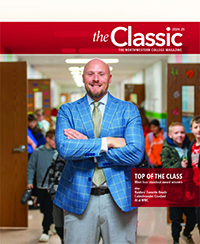NWC team wins programming competition
Tuesday, November 6, 2007
The Northwestern team—John Calsbeek, a sophomore computer science major from Orange City; Jeff Regan, a sophomore computer science major from Council Bluffs, Iowa; and Curt Van Wyk, a junior mathematics major from George, Iowa—combined to solve five of the nine problems in the five-hour competition. Out of more than 200 teams competing at 16 sites in the North Central region, they placed eighth.
The only teams in the region that placed better than Northwestern’s were from the University of Wisconsin-Madison, Michigan Tech, Iowa State, the University of Nebraska-Lincoln, South Dakota School of Mines and Technology, and Lawrence University.
“I really can’t say enough good things about the team’s effort,” says Michael Wallinga, instructor in computer science at Northwestern. “They performed excellently. They were smart about their selection of problems to work on and who on the team would do each one. They made sure a problem was correct when they turned it in so they wouldn’t get penalty minutes assessed.
“John, Jeff and Curt are strong problem-solvers and knowledgeable programmers who have a good command of the language they were working in (Java). They also have a great group dynamic,” says Wallinga.
This marks the second consecutive year that a Northwestern team has finished in the top 10 in the region.
A second Northwestern team placed fifth at the local site and 75th in the region this year. Solving two of the problems were team members Andrew Engesser, a sophomore computer science major from
Wallinga describes the competition problems as great brain-teasers. He says performing well at the competition requires students to demonstrate creativity, teamwork, the ability to determine which problems are within their capability to solve, and the ability to work under time pressure.
Huddled around a single computer, teams of three students collaborate to deduce the requirements, design test beds and build software systems that solve complex, real-life problems under the scrutiny of expert judges. The winning team is the one that solves the most problems in the fewest attempts within the least amount of time.
Over 6,000 college and university teams from 82 countries are participating in the competition, which is in its 32nd year and is sponsored by IBM. The top 90 teams will compete in the world finals in


